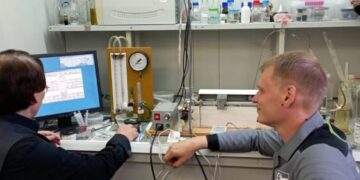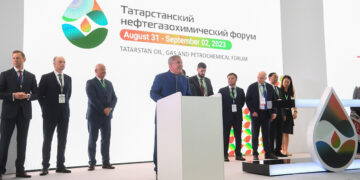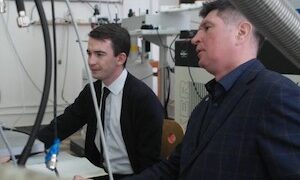KFU has Developed Software for Predicting Catalyst Absorption During Oil Displacement
Modeling dynamic adsorption under multiphase flow conditions is important for predicting the efficiency of in-situ upgrading of heavy oil.
Kazan Federal University has developed a software package for modeling the dynamic adsorption of water-soluble catalysts during oil displacement in digital cores. The Devon News Agency learned about this from the press service of the world-class Scientific Center “Rational development of the planet’s liquid hydrocarbon reserves.”
Information on the adsorbed amount of catalyst under dynamic conditions, the reserves of which make up the majority of liquid hydrocarbons in Russia.
A group of scientists from the Institute of Geology and Oil and Gas Technologies of Kazan Federal University, within the framework of a megagrant from the Russian Science Foundation, has developed a software package for modeling the processes of dynamic adsorption of catalysts under multiphase flow conditions. The grant provides funding of 128 million rubles for research on the four-year project “Development of new technological approaches to the catalytic underground upgrading of high-viscosity and ultra-viscous oil.”
One of the areas of work within the framework of the megagrant was the development of a software package for modeling the dynamic adsorption of water-soluble catalysts during oil displacement in digital cores.
To partially process hydrocarbon raw materials and improve the quality of heavy oil in reservoir conditions directly in the fields under thermal steam exposure, it is necessary to use water- or oil-soluble catalysts. If they enter a porous medium, they may be subject to adsorption, during which catalyst particles are deposited on the surface of geological rocks.
On the one hand, adsorption has a negative effect. On the other hand, adsorbed particles may be useful during repeated thermal steam exposure during aquathermolysis. While static adsorption of a catalyst under conditions of immobility has been well studied, results on adsorption under dynamic conditions (with a moving filtration flow) were previously absent.
“The novelty of our work, the results of which are reflected in the scientific article, lies in the fact that dynamic adsorption is considered in multiphase flows, that is, in the process of oil displacement,” explained Timur Zakirov, associate professor of the department of mathematical methods in geology at IGiNGT. “Before this, we worked with single-phase flows, when the catalyst was dissolved in water and moved in a sample that also contained water.”
To solve the problem, KFU scientists used the Digital Core technology and developed a software package for modeling the processes of dynamic adsorption of catalysts under multiphase flow conditions. The mathematical model allows you to study both water- and oil-soluble catalysts, and also takes into account all the most important development parameters, such as oil viscosity, interfacial tension, contact angle, etc.
Knowing the viscosity of oil and other field development parameters, it is possible to predict how much catalyst will be lost as a result of adsorption. Under certain development parameters, in particular at low interfacial tensions, a significant portion of the catalyst is adsorbed on the particle surface, which will significantly reduce the efficiency of catalytic aquathermolysis.
As part of the study, for the first time, a classification of the regimes of dynamic adsorption of a catalyst during oil displacement was carried out. It has been shown that at low adsorption intensity, a decrease in the catalyst flow rate in the pore space contributes to an increase in the adsorbed amount. And at high adsorption intensity, the absorbed amount of catalyst is determined by the efficiency of oil displacement.
“The research is important for predicting the effectiveness of using technology and selecting optimal conditions for using reagents at a depth of up to 1 thousand meters,” noted project manager, head of the department of development and exploitation of hard-to-recover hydrocarbon deposits at IGiNGT Mikhail Varfolomeev.
Devon News Agency reported that KFU has learned to “refine” heavy oil in the reservoir and extract rare earth metals from it.







